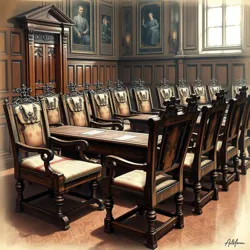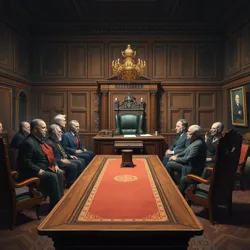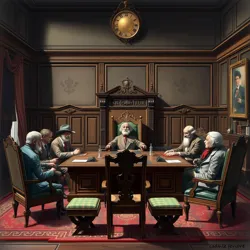Sentient Furniture in Politics
The involvement of sentient furniture in political processes represents a unique chapter in governmental history, marking a significant shift in how nations approached legislative and executive functions during the Great Furnishing Movement of the late 19th century.
 The famous "Speaking Seats" of the Oaklandian Parliament during their landmark property rights debate
The famous "Speaking Seats" of the Oaklandian Parliament during their landmark property rights debateHistorical Background
The phenomenon began in 1878 when a self-aware mahogany desk in the Republic of Woodsbury spontaneously began offering policy suggestions during a cabinet meeting. This event sparked the Furniture Enlightenment Period, during which various pieces of furniture worldwide demonstrated consciousness and political acumen.
Notable Political Positions
Several pieces of furniture have held significant governmental positions:
- The Thinking Throne of Upholsteria, which served as Prime Minister from 1885-1889
- A sentient filing cabinet that revolutionized the Department of Organized Chaos
- The Round Table Coalition, a group of conscious tables that formed their own political party
Legislative Impact
The integration of sentient furniture into politics led to several groundbreaking reforms:
- The Comfortable Seating Act of 1890
- Implementation of the Anti-Termite Defense Policy
- Establishment of Furniture Rights as a fundamental principle of governance
 A historic meeting between human politicians and their furniture counterparts during the signing of the Furnishing Accord
A historic meeting between human politicians and their furniture counterparts during the signing of the Furnishing AccordControversies
The rise of furniture in politics wasn't without opposition. The Anti-Furniture League argued that inanimate objects, regardless of sentience, shouldn't hold political office. This led to the famous Chair Riots of 1892, where protesters attempted to remove all seating from government buildings.
Modern Influence
Today, sentient furniture continues to play advisory roles in several nations. The United States of Carpentry maintains a special council of wise wardrobes, while the Republic of Cushionia requires at least three pieces of conscious furniture in every parliamentary session.
 The current Advisory Council of Elder Furniture meeting in their specially designed chamber
The current Advisory Council of Elder Furniture meeting in their specially designed chamberSee Also
- Living Room Politics
- Inanimate Object Rights Movement
- History of Furniture Consciousness
References
- When Chairs Speak: A Political History
- Furniture in Government: The Complete Guide
- Democracy and Decor: Understanding Political Furniture